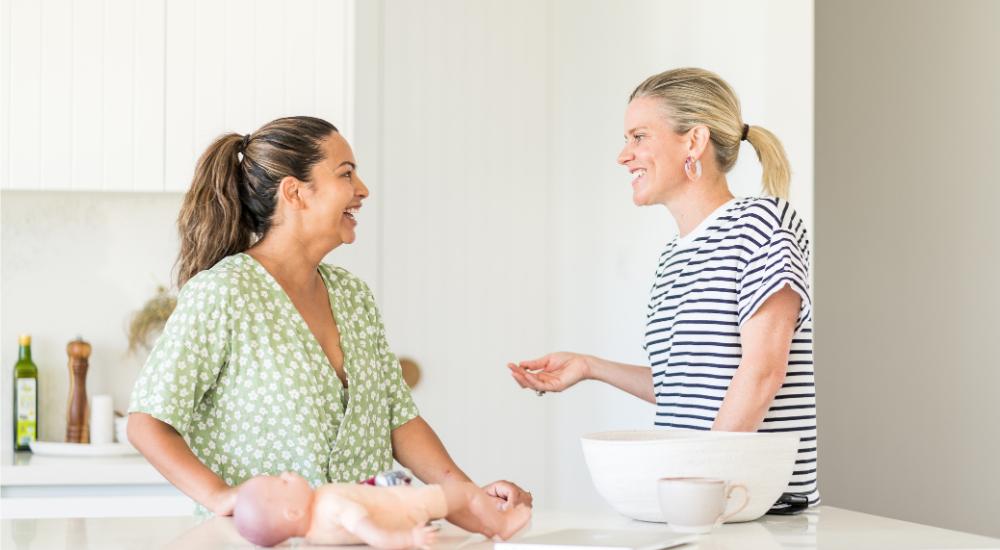"Welcome to motherhood" is not helpful
Why we need to listen to new Mums when they say they’re not OK
This week, I want to share a personal story from one of our beautiful Birth Beat Mummas.
While awareness around perinatal (the time before and after childbirth) mental health is growing, it is still a relatively under-discussed issue that affects up to 1 in 10 new mums and 1 in 20 new dads.
This is something that I’m passionate about bringing more awareness, compassion and understanding. Based on those stats, it’s very likely that someone you know – whether it’s in mother’s group, a family member or co-worker – or perhaps even you, have or will struggle with perinatal anxiety or depression.
Many readers may already be aware that even as a midwife and mum of one, I struggled after the birth of my son Theo.
While it was obviously one of the most difficult times in my life, it’s an experience I’m grateful for. Because I know that it’s made me a better midwife and fuelled my determination to help other parents, both through prevention and awareness.
Just a few weeks ago, I received the most beautiful, raw and honest email from a Birth Beat Mumma. While it broke my heart to hear that she’d been struggling, I also felt unbelievably proud of her for being so brave and generous.
With this gorgeous Mumma’s permission to share with you, here is her story:
Hi Edwina,
It’s taken a long while to sit down and write this – it comes on the back of attending the Yoga and Mums mini retreat and then your email to ‘Eat the frog’. My story is not uncommon, but not easy to share and still evokes strong emotions in me at times.
I remember thinking that when our bub was born I would feel so excited to share our good news with you and the Birth Beat team like so many others have…but when the time came, I just didn’t seem to be able to relate to any of the happy stories that parents were sharing. Looking at the posts I thought,
“Surely, they must be faking that happiness, because I don’t feel that. Shell shock, first time mum stuff,” I told myself.
“I’ll send that message in a few weeks’ time when things have settled down and I’ve started to adjust to motherhood.” But, my story didn’t really pan out that way.
I had a great pregnancy with the typical nervous but excited anticipation of meeting our little one. I felt well prepared having attended your Birth Beat class, looking forward to an active labour but prepared for all eventualities on the day. Except one…I was 10 days overdue with a planned induction the following day.
“I can do this; I’ve prepped for this” I told myself.
“It’s not what I would choose but I can do it.”
Instead at the 11th hour I was recommended to have an elective c-section. This floored me, and in retrospect more than I had realised at the time. I could rationalise the need for a c-section but will admit I felt robbed of the opportunity to put your teaching into practice. I reassured myself with what’s best for bub and myself is the most important thing. In reality, it was this moment that was the catalyst into postnatal depression.
I had no significant risk factors, no history of mental health issues and would normally consider myself a very calm, resilient kind of person. The birth itself, although a booked c-section, wasn’t an enjoyable experience, nor the hospital stay.
“Just wait ‘til you get home,” I would tell myself. “And things will be ok.”
I felt I had prepared myself for the reality of being mum. Sleepless nights, feeding difficulties, sickness etc. I coped OK in the first few weeks. Pat on the back to myself – it’s tough but you’re doing it, look you’ve kept your baby alive for a day, a week, 1 month, 2 months…. but, this ‘things are not quite right feeling’ just wouldn’t budge. I hadn’t expected to still feel like this several more months later.
Breast feeding wasn’t easy, but I persisted not wanting to feel like a ‘failure’ at this also and eventually we got there after several bouts of mastitis and lots of support from the lactation consultant, doctors and allied health services. Success finally!
“Right,” I tell myself “now I can go on and adjust to motherhood like I’ve seen others do, move on from this just surviving stage.”
But survival was all I could do for what seemed like a very long time. I remember talking to friends, other mums to gauge or get a reference point of how I was doing. I felt like I was really struggling, but unfortunately every person I spoke to said, “welcome to motherhood”.
I spoke to a few health professionals “what you’re describing is very normal and common”. Later I realised if someone handed me a list of symptoms of postnatal depression at this time, I could have ticked 90% of them.
So, I continued to struggle on, telling myself it will get better. But I didn’t believe myself, I couldn’t see that happening, there was no light at the end of my tunnel. The hard days became harder, more frequent and I struggled to find any joy in my experience as a mother. There was an overwhelming sense of hopelessness.
Finally, months later someone asked me “Are you OK?”
“No” I sobbed. “I don’t recognise myself”.
Someone that day took the time to ask how I was. Truly listen to my story and validate the way I was feeling. I felt like I had tried to seek help prior, but no one had truly listened up until this point.
I was already doing all I could to look after myself – eating well, exercising, taking time out. For me it just wasn’t enough, and medication and psychology input were needed. With the right supports and services in place, I can now truly say I am starting to adjust to motherhood and can find joy in the everydayness of the experience that a short while ago I couldn’t.
In a very long and roundabout way I wanted to thank you and the broader team who contributed to making the Yoga and Mums mini retreat happen. Thank you for sharing your story and bringing attention to postnatal anxiety and depression. Statistically 1 in 5 females and 1 in 10 males will experience postnatal anxiety or depression. In the antenatal Birth Beat class, I attended this means least 1 other mum and 1 dad from that group is likely also experiencing postnatal depression or anxiety.
I want to reinforce the it’s OK to not be OK message, put the onus on everyone in our community to check in on our expecting or new mums and dads and I encourage those suffering to take those first few brave steps to seek help. It doesn’t have to keep feeling like this.
These days when you see me smile its genuine.
The ‘welcome to motherhood’ comment was especially frustrating. Yes, being a new mum can be tough… there is literally nothing else to compare it to. But, feeling tired and adjusting to your new normal is very different to experiencing post-natal depression or anxiety. We need to help more people understand this and to please, never dismiss a parent, or anyone for that matter, who tells you that they are struggling.
In the very least, listen to them. Truly listen and let them feel heard. Don’t brush it off and try and change the subject to ‘cheer them up’ – if they’ve opened up to you and told you they’re having a tough time, respect how hard that was and offer your support and help in any way that you can.
If you’d like to understand what these can feel like or symptoms to be aware of, for yourself or others, it might be useful to take a look at our Mental Health Check-in post.
Education and awareness are big steps in helping to bring light to this issue that unfortunately affects so many. There are far too many Mummas, and Dads too, struggling in silence with perinatal depression and anxiety. Another huge step in raising awareness is through brave people, just like this amazing Birth Beat Mum, who find the immense courage to share their story and help others to know that they’re not alone, that help is available and perhaps most importantly of all, that there’s hope.
Let’s be kind to ourselves and others. Thank you again to the beautiful woman who shared this story – you know who you are, and your words will no doubt help many.



